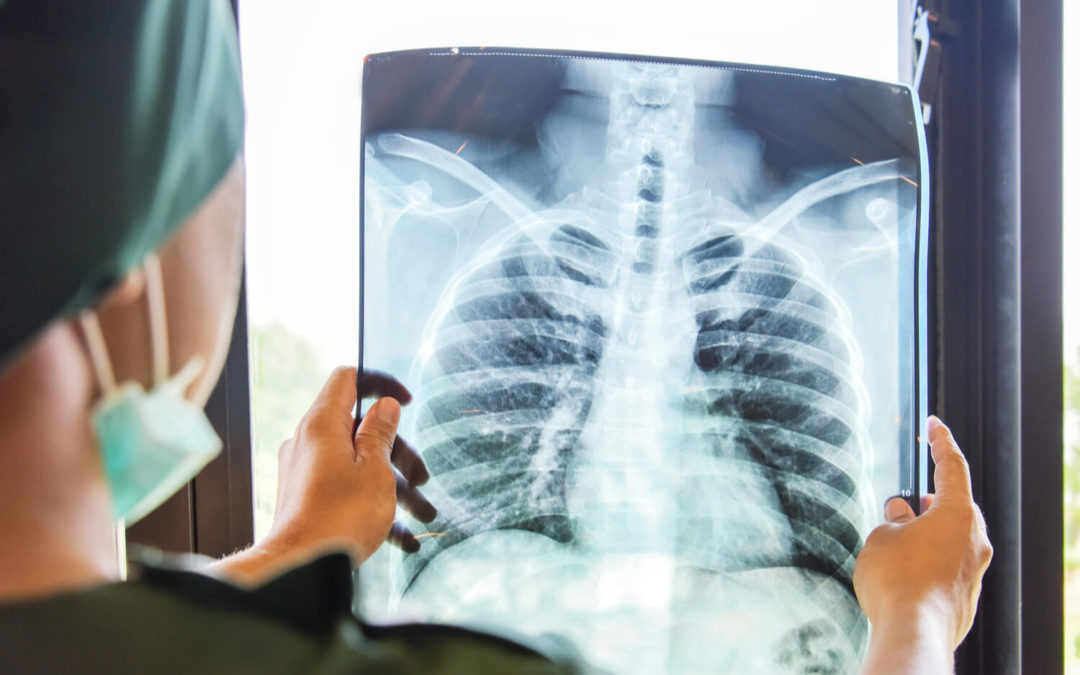What is Lung Cancer Awareness Month?
Every November is Lung Cancer Awareness Month. The driving force behind this awareness month is the American Lung Association. Every November, they encourage Americans to fight back against lung cancer through educational and fundraising events.
Proceeds from sponsored fundraising events are donated to lung cancer research, advocacy programs, quit smoking programs, and clean air initiatives.
What is the Lung Cancer Awareness Color?
The color of the lung cancer awareness ribbon is white or pearl.
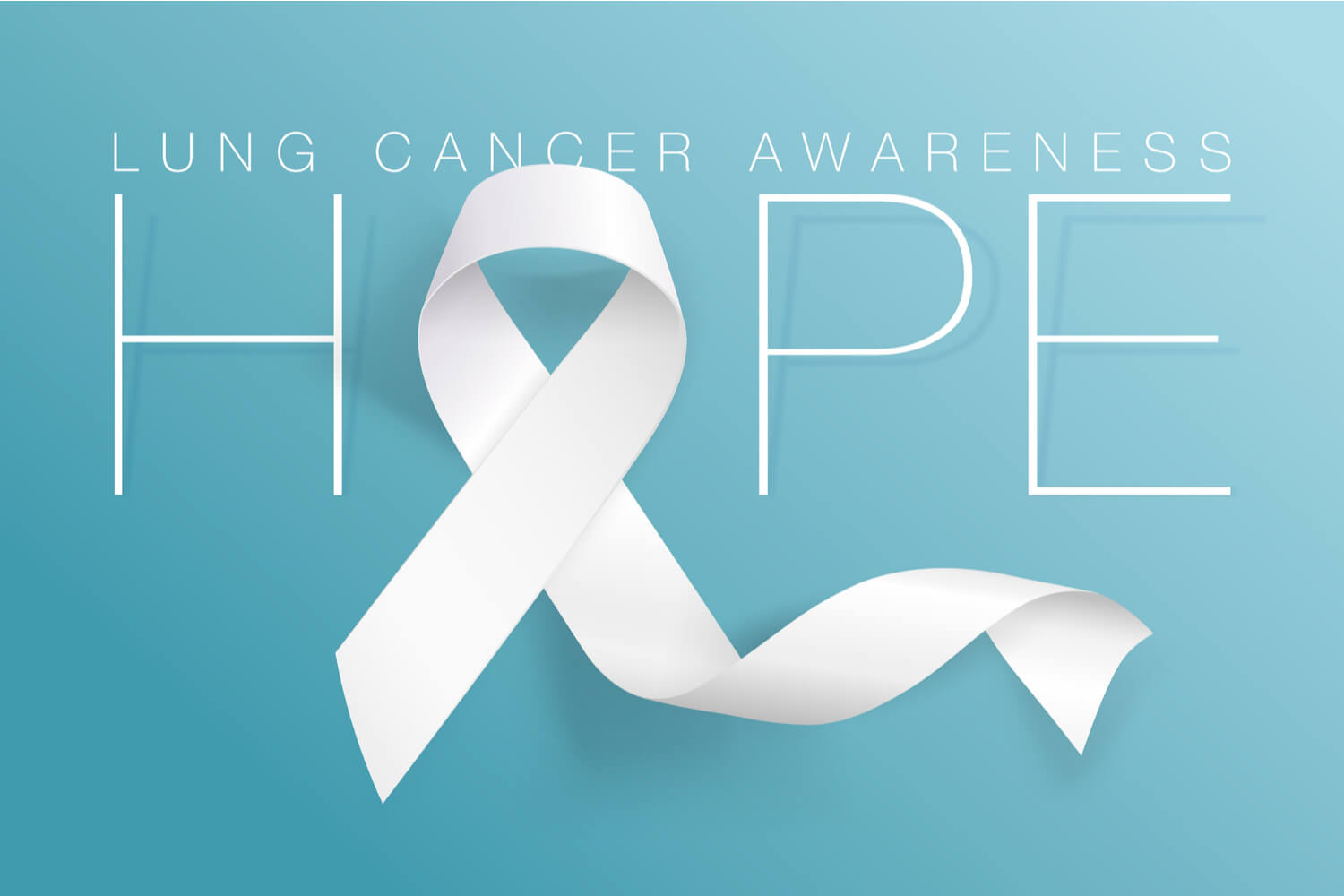
What is Lung Cancer?
Lung cancer occurs when the cells inside of the lungs mutate and begin growing at an uncontrollable rate. Usually, the process of cell division allows the body to replace old cells with new cells as needed. However, cell division can become dysfunctional, or begin duplicating damaged or incomplete cells. As more and more of these malformed cells are produced they clump together into a tumor.
Depending on the condition of the cells, a tumor can be either cancerous (malignant) or non-cancerous (benign). If left untreated, cancerous tumors will spread to other parts of the body. With lung cancer, cancerous cells usually spread to the lymph nodes next, but can also travel to surrounding or far away tissues.
How Common is Lung Cancer?
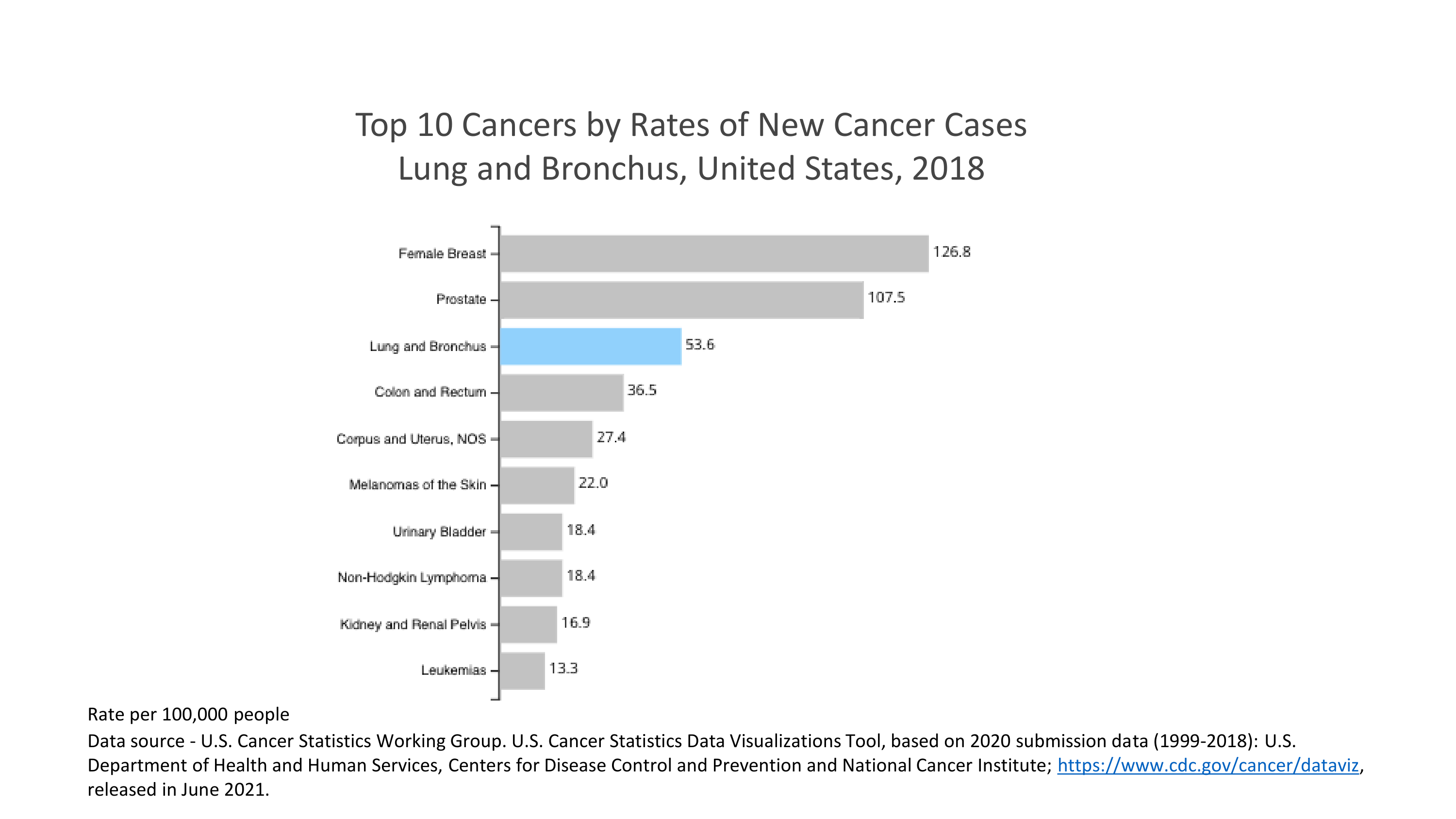
In 2018, lung and bronchus cancer was ranked third out of all new cases of cancer in the United States at a rate of 53.6 new cases per 100,000 people. Only female breast cancer and prostate cancer ranked higher than lung cancer for new cases in 2018.
How Deadly Is Lung Cancer?
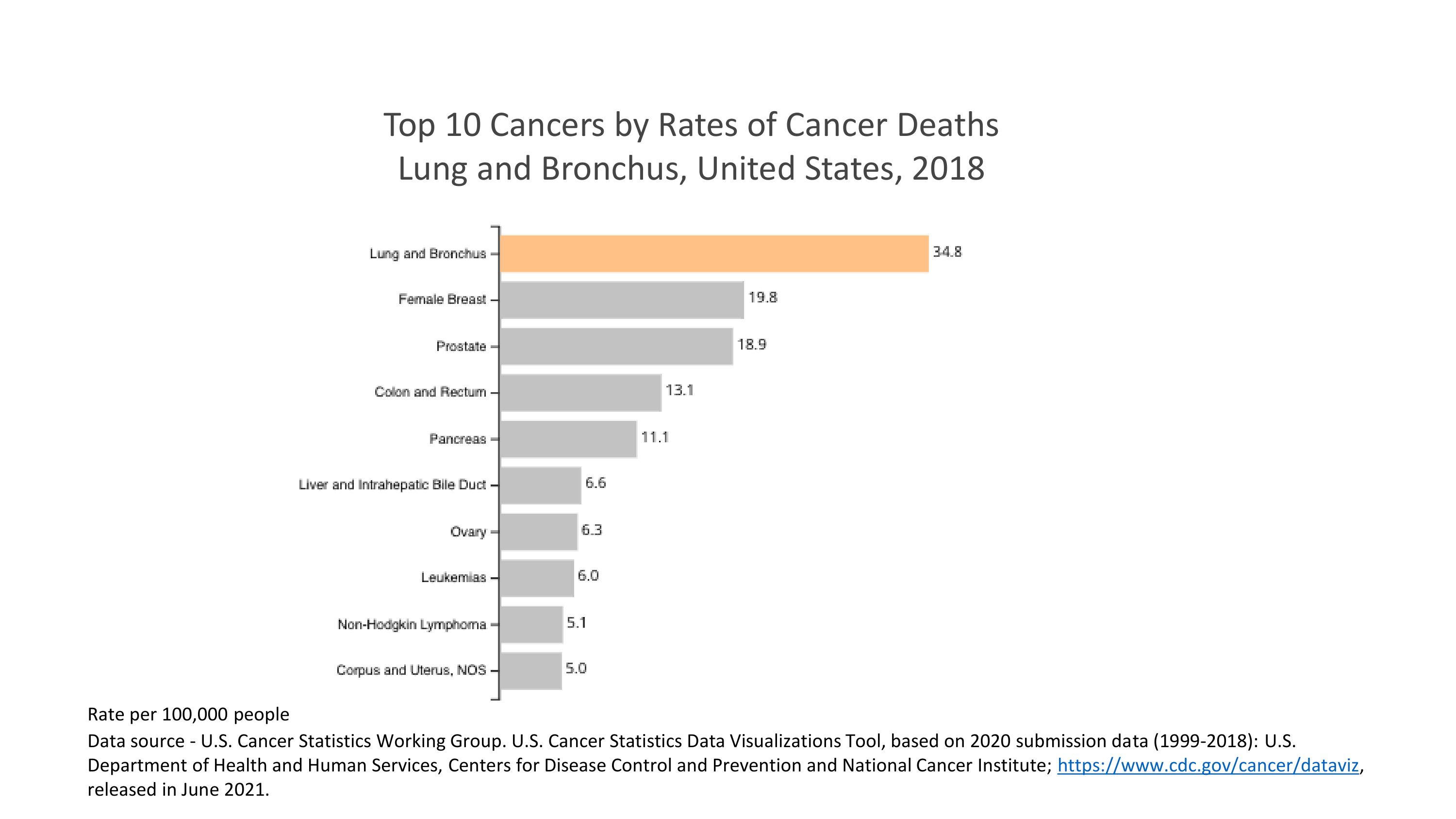
In 2018, lung and bronchus cancer ranked first out of all types of cancer deaths at a rate of 34.8 per 100,000 people.
Types of Lung Cancer
Lung cancers are classified into two larger categories: non-small cell lung cancer, and small cell lung cancer. There are also a few fringe types of lung cancers that fall outside of these two main categories.
Non-Small Cell Lung Cancer (NSCLC)
According to the American Cancer Society, between 80 and 85 percent of all lung cancers are NSCLC. Within this category, there are several sub-types. However, professionals choose to group these cancers together
Adenocarcinoma of the Lung
This type of lung cancer tumor develops in the cells that produce mucus in the lungs. These account for about 30 percent of all lung cancer cases (Cancer Treatment Centers of America). Adenocarcinomas can also develop in the alveoli.
A long history of cigarette smoking greatly increases the risk of developing this type of cancer.
Adenocarcinoma in situ (AIS) or Bronchioloalveolar Carcinoma
This type of cancer occurs when cancerous cells are found in the mucosal membrane of the lungs, but have not yet spread to other parts of the body. Usually, this type of cancer is fairly treatable and generally has a good prognosis.
Squamous cell carcinoma
Not to be confused with squamous cell carcinoma of the skin, this type of lung cancer occurs in the squamous cells in the lungs. Squamous cells line the airways to protect the respiratory system. Prolonged exposure to smoking, secondhand smoke, or exposure to environmental hazards like radon, can increase the risk of this cancer.
Large cell (undifferentiated) carcinoma
This is an aggressive, fast-spreading cancer. It can develop anywhere in the lungs and is difficult to treat.
Large cell neuroendocrine carcinoma
This is a rare subtype of undifferentiated carcinomas of the lung. Tumors of this type are made up of both large and small cell lung cancers.
Adenosquamous carcinoma
A rarer type of NSCLC that is cancerous and presents qualities of both adenocarcinoma and lung squamous cell carcinoma of the lung.
Sarcomatoid carcinoma
A rare type of lung cancer that is not completely understood, and usually does not have a good outlook.
Small Cell Lung Cancer (SCLC)
Between 10 and 15 percent of all lung cancer cases are SCLCs. Small cell lung cancer tumors develop faster than large cell lung cancer tumors. The fast-growing nature of SCLC actually makes these types of tumors respond well to chemotherapy. Radiation therapy treatments are also effective at treating small cell lung cancer.
Other Types of Lung Tumors
- Lung carcinoid tumors
- Adenoid cystic carcinoma
- Adenoid cystic lymphoma
- Adenoid cystic sarcoma
- Benign lung tumors – hamartoma
Mastetized Cancers
Cancers that commonly spread to the lungs include breast cancer, pancreas cancer, kidney cancer, and skin cancer. While these cancers may metastasize, or spread, into the lungs these are not categorized as lung cancer.
For example, if a breast tumor metastasizes into the lungs, the cancer treatment team will still treat the tumor as breast cancer. Because even though cancer has spread into the lungs, it is still functionally different from lung cancer.
What Causes Lung Cancer and What Are The Risk Factors?
When your lung cells are exposed to carcinogens repeatedly, your risk for developing lung cancer increases. Through years of research, several chemical risk factors for lung cancer have been identified.
Smoking and Secondhand Smoke
Tobacco products contain several carcinogens. Even if you don’t smoke, but either live with or have frequent contact with someone who smokes, secondhand smoke increases your risk of developing lung cancer.
Radon Exposure
As the name suggests, radon is a radioactive element. Radon is a naturally occurring gas that rises from the ground and it can collect in buildings over a long period of time. Exposure to radon gas is the second leading cause of lung cancer.
Dangerous Environmental Chemicals
Working around or with any of the following substances or chemicals increases your risk of developing lung cancer. However, you should have access to proper breathing and protective equipment while working with these chemicals.
- Asbestos
- Uranium
- Nickel
- Arsenic
- Cadmium
- Chromium
- Petroleum
Particle Pollution
Living somewhere with poor air quality or high levels of air pollution will increase your risk of lung cancer.
Genetics
AS with many medical conditions, some people are predisposed to developing certain conditions. If your family has a history of lung cancer, whether from tobacco use or not, you have a higher risk of lung cancer.
How Do You Lower Your Risks of Lung Cancer?
The most effective way to prevent lung cancer for yourself is to remove or reduce your exposure to environmental risk factors. If you smoke, you should stop smoking as soon as possible. Getting your office or home tested for radon can help you make decisions to reduce the risks in your environment.
Also, if you have any health conditions like obesity or autoimmune disorders, you may be at a higher risk for developing cancer. Therefore, eating a healthy diet with fruits and vegetables in conjunction with a healthy exercise and sleep routine will further help you reduce your risks.
Lung Cancer Screenings
Early detection is one of the best strategies for the prevention and treatment of lung cancer. The earlier a tumor is detected and diagnosed, the sooner a team of surgical oncology professionals and doctors can provide treatment.
Testing for lung cancer usually involves a low-dose CT scan to thoroughly examine the state of the lungs. Due to the cost of this test, it is generally recommended for people aged 50 or older with a history of smoking, or who currently smoke.
Will My Insurance Cover a Low-Dose Lung Cancer Screening?
Yes. Cancer screenings are a medically necessary procedure that saves lives and helps extend the life expectancy of lung cancer survivors. As a result, both private insurance companies and Medicare will offer at least some coverage for lung cancer screenings.
Symptoms of Lung Cancer
- Persistent coughing
- Coughing up blood
- Pain when breathing or coughing
- Hoarseness
- Difficulty breathing
- Fatigue
- Weakness
- Frequently recurring bouts of bronchitis or pneumonia
- Wheezing
- Changes in appetite
- Sudden weight loss
- Breathlessness
Lung Cancer Diagnosis
As mentioned above, lung cancer CT scans are one of the methods used to diagnose lung cancer. X-rays are also used to examine the condition of the lungs for the presence of cancer.
If you’re experiencing frequent bouts of coughing, your doctor may perform tests on the sputum from your coughs. The presence of cancer cells can sometimes be detected in blood, mucus, or spit that comes up from a cough.
Your doctor may recommend a biopsy to take a tissue sample from your lungs to check for cancer cells. Exams can be performed either through the mouth or through minimally invasive laparoscopic procedures.
If the presence of cancer cells is detected, the next phase will be to determine how far your cancer has spread within your body. This is called staging. Stage I cancer will have spread the least, while stage IV cancer will have spread the most.
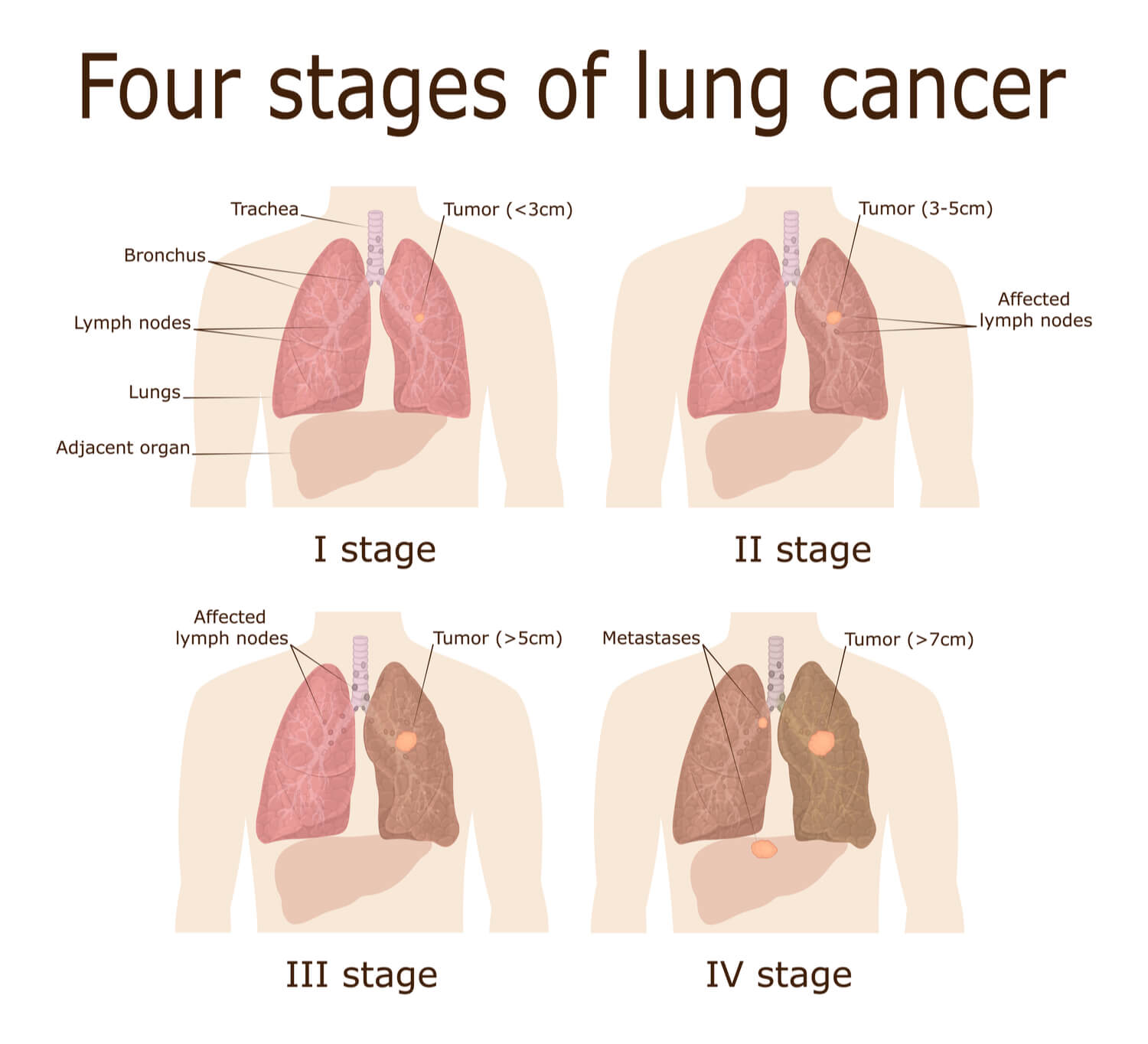
Lung Cancer Treatment
Lung cancer patients will need to work with a team of surgical oncologists, doctors, nurses, and other specialists to create the right plan for treatment. Treatment will look different from one patient to another, but the following treatments are all effective methods for dealing with lung cancer.
- Surgery
- Lobectomy
- Chemotherapy
- Immunotherapy
- Radiation therapy
- Targeted drug therapy
Related: What Is A Lobectomy?
Ways You Can Raise Awareness
You can participate in raising awareness for lung cancer in many ways. If you use Facebook, you can add a filter to your profile picture to show your support for lung cancer awareness.
On any social media platform, you can share graphics, articles, videos, and stories from survivors to help educate your friends about lung cancer.
You can also display a white lung cancer awareness ribbon on your car, in your home, in your office, or even wear one occasionally.
You might also find a local event to participate in to help raise awareness.
We invite you to visit The American Lung Association LUNG FORCE website to learn more about getting involved in raising awareness.
Lung Cancer Treatment At The Surgical Clinic
If you or a loved one are concerned about or need treatment for lung cancer, schedule a consultation with one of our board-certified surgical oncologists.

